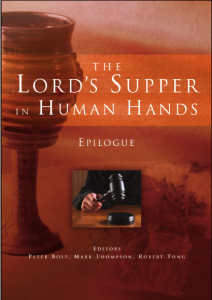Review: The Lord’s Supper in Human Hands – Epilogue
 An epilogue to The Lord’s Supper in Human Hands, a treatise on lay and diaconal administration of Holy Communion which I reviewed some time ago, has been made available as a free pdf.
An epilogue to The Lord’s Supper in Human Hands, a treatise on lay and diaconal administration of Holy Communion which I reviewed some time ago, has been made available as a free pdf.
I was off-deck when the Appellate Tribunal brought its 2010 response to the Synod of Sydney’s resolution accepting legal argument for non-presbyteral administration. I wondered at the time what Sydney’s response would be. The synodical outcome is old news now. But now we have easy access to the booklet that outlines the basis for it.
No great commentary from me. Just a few points.
- Bp. Peter Brain’s minority report in the Appellate Tribunal’s decision is I think thoughtful, balanced and well-spirited.
- Bp. Glenn Davies’ response to the decision says nothing new but brings new clarity to his argument. He does make a clear emphasis on the disparity in the logic used by the AT to recognise provision for women bishops in the current legislative corpus, but not diaconal administration. I agree with him at least to say that the disparity should never have existed: the AT interpretation that led to female episcopacy was an insipid way of recognising that practice – its proponents should have argued it into joyous acclamation and reception, not slipped it through a judicial backdoor.
- Bp. Davies assumes the AT decision is “advisory” not a “determination” and Robert Tong explicates this in his chapter on constitutional arrangements. I assume that this issue will be the next legal question raised. Which in turn raises an interesting question about whether the AT will need to determine something about itself – and whether any response that it is determinative could then itself be taken as advisory!
Unsurprisingly the “judicial” aspects of the Anglican Church of Australia have failed to resolve this question. I concur with Bp. Brain’s emphasis on fellowship rather than legalism here.



